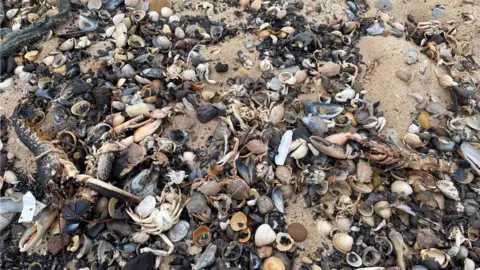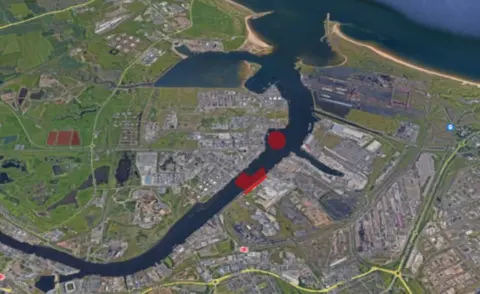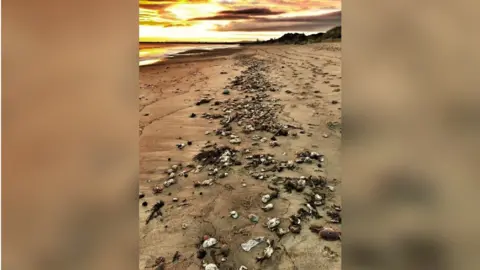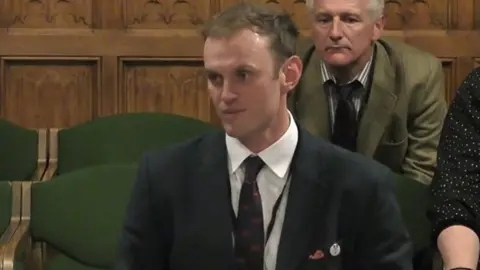Teesside freeport work continues despite crab death concern
 Sally Bunce
Sally BunceWork to build a freeport on Teesside will continue as a debate about dredging and shellfish deaths rages.
Thousands of crabs died in October 2021 along the North East coast with fishermen blaming dredging in the River Tees for releasing a toxic chemical.
Though the government said an algal bloom was to blame, concerns have been raised with MPs about future dredging as part of the Teesworks freeport.
South Tees Development Corporation said dredging as a cause had been ruled out.
The Environment, Food and Rural Affairs Committee has heard regular maintenance dredging was being carried out around the mouth of the Tees when the first die offs occurred.
Though government scientists and PD Ports, which is responsible for the waterway, said the deaths were a coincidence, academics commissioned by the North East fishing industry claimed the dredging of a slippage of sediment on the river bed could have released a chemical called pyridine which tests showed was "exceptionally toxic" to crabs.
The maintenance dredging, which PD Ports said has been carried out six days a week for decades without incident, is different to the dredging work that started eight weeks ago as part of the creation of the freeport's South Bank Quay near Redcar and which has only seen material dumped on land, not at sea.
 South Tees Development Corporation
South Tees Development CorporationBut Gary Caldwell, a marine scientist at Newcastle University, called for dredging as part of the creation of the freeport to be halted until a survey of what chemicals are in the river bed is carried out.
He also said he had received a letter from three government departments asking for his data "so we can work together to stop the dredging of the South Bank".
A spokeswoman for the Department for Environment, Food and Rural Affairs (Defra) said claims government agencies had "called for capital dredging on the South Bank Quay to stop are incorrect", adding the department was "keen" to study the academics' research "in detail".
Dr Caldwell also told MPs there were "multiple stresses" acting on the North Sea, including algal blooms, but there were "strong indicators some major event broke that stress system".
He said his group was not against development but wanted it done in a way that would not risk killing marine life, adding: "We do not want to stop new jobs, new innovation, but we want that to happen without effectively allowing our marine environment to be ripped asunder."
 Paul Grainger /PA Wire
Paul Grainger /PA Wire He said there was a long history of industry on the Tees and it would be "sensible and pragmatic" for dredging to "happen safely with the right kind of technology and mitigation", adding: "Who knows if there is another surprise waiting for us?"
Fishermen told the MPs' committee they were "terrified" of more dredging with Joe Redfern, secretary of Whitby Commercial Fishing Association, saying it was "undoubtable" that dredging and the release of pyridine were linked to the deaths that had seen catches drop massively and livelihoods threatened.
He said: "The fishing community is completely terrified if this next round of dredging goes ahead there's going to be nothing left and that's going to be the complete nail in the coffin.
"That's what we are fighting for to prevent that round of dredging until we are completely sure there are no toxins."
 Parliament TV
Parliament TVA spokesman for South Tees Development Corporation said all work was being carried out in accordance with the licence granted by the Defra and Marine Management Organisation who "continue to rule out dredging as a likely cause".
He said: "We continue to follow all legal standards and requirements as is required."
He also said Tees Valley Mayor Ben Houchen "continues to push government for financial support for those fishermen whose livelihoods have been affected by this issue".

Follow BBC North East & Cumbria on Twitter, Facebook and Instagram. Send your story ideas to [email protected].
